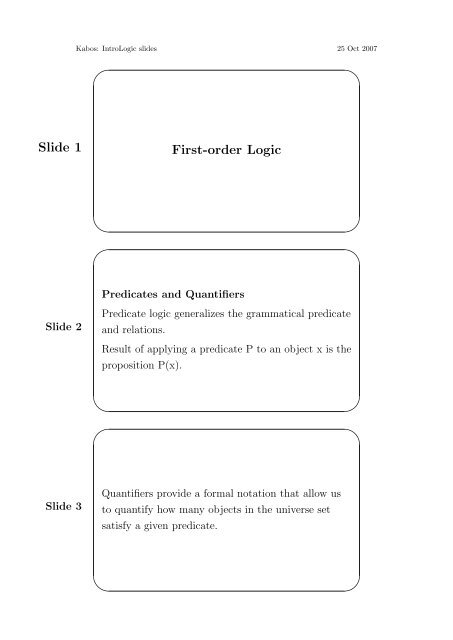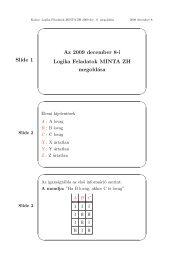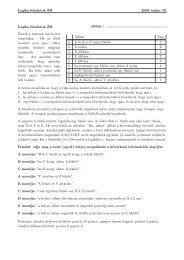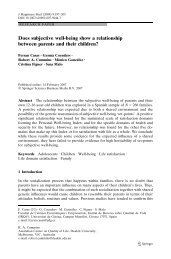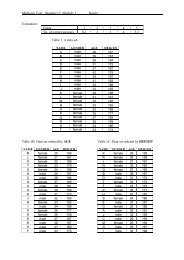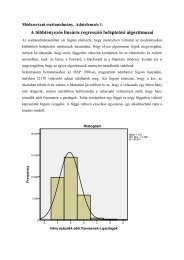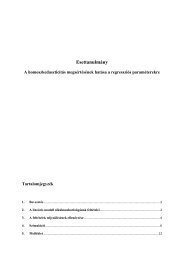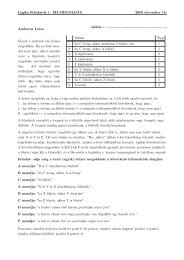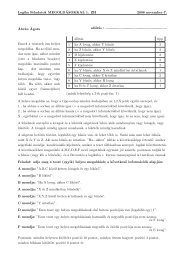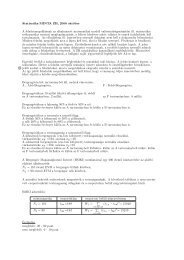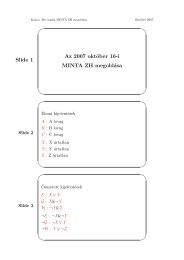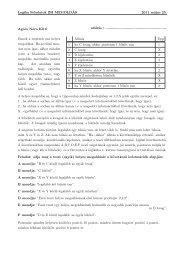Slide 1 First-order Logic
Slide 1 First-order Logic
Slide 1 First-order Logic
You also want an ePaper? Increase the reach of your titles
YUMPU automatically turns print PDFs into web optimized ePapers that Google loves.
Kabos: Intro<strong>Logic</strong> slides 25 Oct 2007<br />
✬<br />
✩<br />
<strong>Slide</strong> 1<br />
<strong>First</strong>-<strong>order</strong> <strong>Logic</strong><br />
✫<br />
✬<br />
✪<br />
✩<br />
Predicates and Quantifiers<br />
<strong>Slide</strong> 2<br />
Predicate logic generalizes the grammatical predicate<br />
and relations.<br />
Result of applying a predicate P to an object x is the<br />
proposition P(x).<br />
✫<br />
✬<br />
✪<br />
✩<br />
<strong>Slide</strong> 3<br />
Quantifiers provide a formal notation that allow us<br />
to quantify how many objects in the universe set<br />
satisfy a given predicate.<br />
✫<br />
✪
Kabos: Intro<strong>Logic</strong> slides 25 Oct 2007<br />
✬<br />
✩<br />
<strong>Slide</strong> 4<br />
U: all animals<br />
A(x): x is an alligator<br />
R(x): x is a reptile<br />
Z(x): x lives at the Zoo.<br />
Some reptile lives at the zoo.<br />
∃x (R(x) & Z(x))<br />
✫<br />
✬<br />
✪<br />
✩<br />
<strong>Slide</strong> 5<br />
U: all animals<br />
A(x): x is an alligator<br />
R(x): x is a reptile<br />
Z(x): x lives at the Zoo.<br />
Every alligator is a reptile.<br />
∀x (A(x) → R(x))<br />
✫<br />
✬<br />
✪<br />
✩<br />
<strong>Slide</strong> 6<br />
U: all animals<br />
A(x): x is an alligator<br />
R(x): x is a reptile<br />
Z(x): x lives at the Zoo.<br />
There are reptiles which are<br />
not alligators.<br />
∃x (R(x) & ¬A(x)) ⇐⇒ ¬(∀x (R(x) → A(x)))<br />
✫<br />
✪
Kabos: Intro<strong>Logic</strong> <strong>First</strong>-<strong>order</strong> theories / 1<br />
<strong>First</strong>-<strong>order</strong> theories<br />
Propositional calculus<br />
Syntax<br />
Variable (in Propositional Calculus):<br />
an element of the Universe set {T, F }<br />
List of symbols:<br />
1. variables: A, B, C,...<br />
2. logical constants T, F<br />
3. logical operators: ¬, &, ∨, →, ↔, ...<br />
4. parentheses ( left , right)<br />
Formula: is defined recursively by the rules<br />
1. variable or constant<br />
2. if ϕ is a formula then ¬ϕ is a formula<br />
3. if ϕ and ψ are formulae then ϕ → ψ is a formula<br />
4. nothing else is a formula<br />
<strong>Logic</strong>al axioms:<br />
A1: ϕ → (ψ → ϕ)<br />
A2: (ϕ → (ψ → ρ)) → ((ϕ → ψ) → (ϕ → ρ))<br />
A3: (¬ϕ → ψ) → ((¬ϕ → ¬ψ) → ϕ)<br />
Inference rule Modus Ponens (MP):<br />
if ϕ → ψ and ϕ then ψ<br />
Let S be a set of formulae.<br />
Proof (=formal derivation) of a formula ϕ in S is a sequence<br />
{ϕ 1 , ϕ 2 , ϕ 3 , ϕ 4 , ...ϕ i , ...ϕ} if every ϕ i is either elements of S, or a logical<br />
axiom, or is made from two previous ϕ’s by inference rule Modus Ponens.<br />
S ⊢ ϕ means that ϕ is provable (has a formal derivation in S).<br />
Closure of S : set of all provable formulae in S.
Kabos: Intro<strong>Logic</strong> <strong>First</strong>-<strong>order</strong> theories / 2<br />
Semantics<br />
Interpretation of a formula: substituting values into variables.<br />
A variable takes an element from the universe, and the interpreted formula<br />
takes either T or F<br />
Model of S : an interpretation when all formulae in S are T<br />
S |= ϕ means that ϕ is entailed by S, that is ϕ takes T in every possible<br />
model of S<br />
Soundness: if S ⊢ ϕ then S |= ϕ<br />
Completeness: if S |= ϕ then S ⊢ ϕ<br />
It can be seen, that Propositional <strong>Logic</strong> is sound and complete.<br />
<strong>First</strong>-<strong>order</strong> Calculus<br />
Individual variable: (in <strong>First</strong>-<strong>order</strong> Calculus)<br />
an element of a given Universe set U.<br />
List of symbols:<br />
1. individual variables: x, y, z , ...<br />
2. constants: c,...<br />
3. predicate variables (relations): P, Q, R ...<br />
4. functions: f, g<br />
5. quantifiers, universal: ∀ , existential: ∃<br />
6. logical operators: ¬, &, ∨, →, ↔, ...<br />
7. parentheses ( left , right)<br />
Term: is defined recursively by the rules<br />
1. individual variables and constants are terms,<br />
2. if t 1 , .., t N are terms and f is a function then f(t 1 , t 2 , ..., t N ) is a term,<br />
3. nothing else is a term.<br />
Atomic formula:<br />
If P is a predicate variable andt 1 , t 2 , ..., t N are terms, then P (t 1 , t 2 , ..., t N )<br />
is an atomic formula
Kabos: Intro<strong>Logic</strong> <strong>First</strong>-<strong>order</strong> theories / 3<br />
Formula: is defined recursively by the rules<br />
1. an atomic formula,<br />
2. if ϕ is a formula then ¬ϕ is a formula,<br />
3. if ϕ és ψ are formulae then ϕ → ψ is a formula,<br />
4. if ϕ a formula and x is a variable, then ∀xϕ is formula,<br />
5. nothing else is a formula.<br />
Free and bounded variables:<br />
1. If ϕ is an atomic formula then x is free in ϕ if x occurs in ϕ<br />
2. x is free in ¬ϕ if x is free in ϕ<br />
3. x is free in (ϕ → ϕ) if x is free in ϕ and does not occur in ψ, or x is free<br />
in ψ and does not occur in ϕ, or x is free in both ϕ and ψ<br />
4. x is free in ∀y ϕ if x is free in ϕ and x is a different symbol than y<br />
5. x is bound in ϕ if x occurs in ϕ and x is not free in ϕ<br />
Rules of substitution variables in formulae, valid and invalid substitutions<br />
(omitted here).<br />
Conventions for equality (omitted here).<br />
<strong>Logic</strong>al axioms:<br />
A1-A3 from propositional logic and<br />
A4. omitted, it uses the concept of valid substitutions<br />
A5. (∀x (ϕ → ψ)) −→ (ϕ → ∀x ψ) provided x is not a free variable in ϕ<br />
Sentence:<br />
Theory:<br />
a formula without free variables<br />
a set of sentences S<br />
Proof (=formal derivation) of formula ϕ from S is the same as in<br />
Propositional Calculus but we have an inference rule Universal<br />
Generalisation (in addition to Modus Ponens)<br />
Universal Generalisation:<br />
if S ⊢ ϕ then S ⊢ ∀x ϕ<br />
Closure of S : set of all provable sentences in S<br />
Consistency of S : if ϕ is provable then and ¬ϕ is not.<br />
Completeness of S : if ϕ is not provable then ¬ϕ is provable.<br />
(to be continued)


